![]() — Russkiy Mir Foundation — Journal — Articles — All Together
— Russkiy Mir Foundation — Journal — Articles — All Together
 All Together
All Together
When several years ago entrepreneur Nikolai Saykin issued a clarion call to restore the rustic estate of the Vologda noblemen Rezanovs-Andreevs “all together”, he could not even imagine that years later, in the hamlet of Kurkino, lying 20 km away from Vologda, an international work camp would be established.
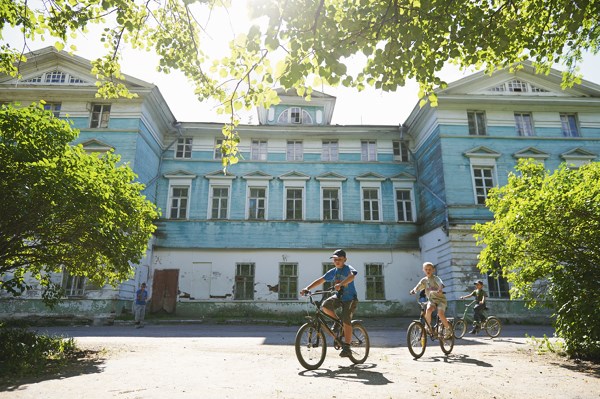 Twenty volunteers from Canada, Spain, France, Finland, Germany and other countries over the course of two weeks cleaned the overgrown ponds, removed garbage from the manor and dismantling the old structures that had earlier burnt down. And they certainly got acquainted with the countryside and its people. The main thing is to start a worthy undertaking and then others will support it.
Twenty volunteers from Canada, Spain, France, Finland, Germany and other countries over the course of two weeks cleaned the overgrown ponds, removed garbage from the manor and dismantling the old structures that had earlier burnt down. And they certainly got acquainted with the countryside and its people. The main thing is to start a worthy undertaking and then others will support it.Early days
The work camp was a voluntary endeavor. Volunteers aged 17 to 30 did not come to the Vologda village as part of a grant project, to conduct a sociological survey or to write articles but rather to become immersed in authentic Russia and the life of its people. This is why they preferred a volunteers’ site to a tourist operator or travel guide as they soaked up the country through smells, scraps of floorboards in an ancient estate, nettle stings and gadfly bites. As the participants of this labor expedition admit, now Russia in their eyes is not a land of bears and balalaikas and certainly not a country of tanks and missiles, but rather “the land of tall trees and long nights,” according to one of the volunteers. A correspondent of Russkiy mir.ru spent one day in the camp.
The program of the guests’ sojourn in the Vologda Region was developed in such a way that they would not have to go searching for impressions. Almost every night there were intercultural sessions with narratives about the participants’ countries of origin, singing, dancing, treats brought from far-off lands and cooked on the spot. On the first day in Kurkino volunteers played football with locals. There were mixed teams without splitting into Russians and non-Russians. On the next day they visited a park of wooden architecture and on the third day they went to Vologda – wandering around the town, dropping by a museum and a night club. The general picture was perhaps incomplete and patchy, but definitely motley. “Russians are very hospitable,” assures Spanish girl Lorena. “I heard about it but did not think this quality is so prominent in them. The humbler people live, the more generous they are.” “I was told in Canada that Russians are cold and unfriendly, but this proved wrong: we were given a very warm reception,” says Adrian, a teacher from Canada.
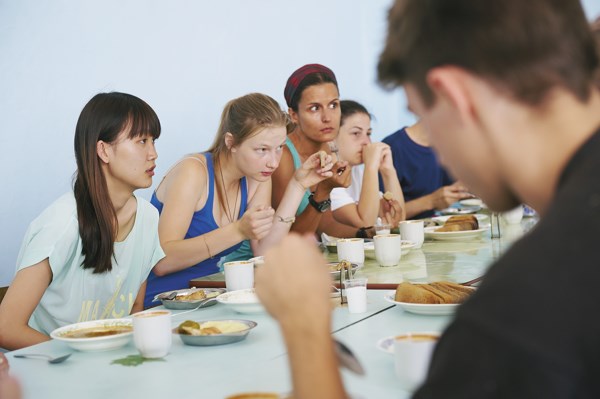
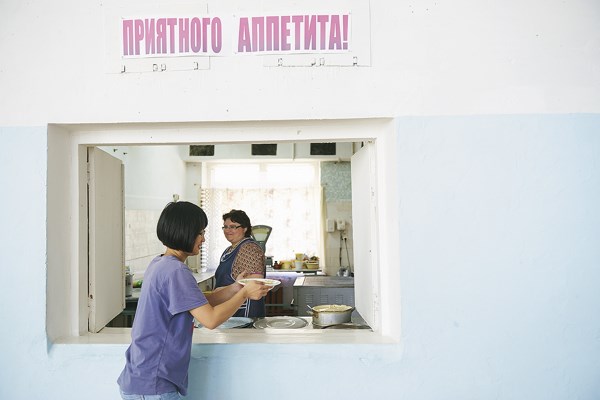
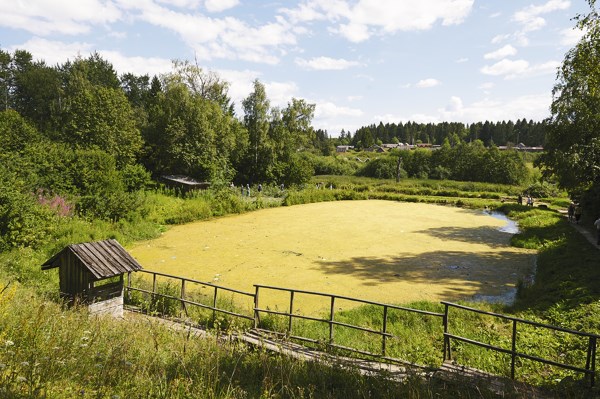 Lunch with seconds
Lunch with secondsThey are volunteers and work accordingly, with chatter and jokes. And the lunch gong immediately lifts everybody’s spirits even more. The foreigners dine in a school canteen, but prior to sitting at a set table the guests quickly adopting Russian manners make fun with the echo in the school corridor and splatter water in the toilet room. Frenchman Florian who has to wait for a spare faucet and sink whiles his time away examining a poster which reads “Do not take too much bread for lunch.”
Notwithstanding this poster, nobody is skimping on the volunteers. It is here that many of them learned the word “dobavka” (seconds). This means that after you finish up the set serve you may go with your plate back to the dispensation counter and, smiling to a cook, get a second helping of the first or second course, listening the tone of the ladle’s knock against the pot to discern how many more times you can come back and ask for more. Today a borsch and patties with mashed potatoes are on the menu.
“They are treated to the same dishes that are cooked for schoolchildren in the village of Kurkino, cooks get no special assignments,” says Ksenia Shorokhova. “Our volunteers are not fussy or hungry. Remember a rice pudding we were treated to in daycares? I still cannot stand it, while the young adults from abroad were delighted to eat it and even asked for extra portions.”
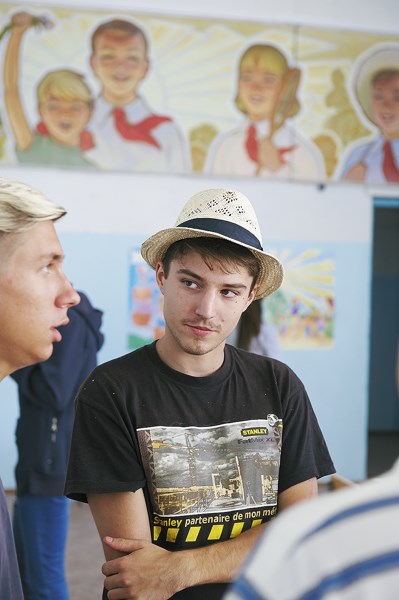 One day the French teenagers Florian and Adele wished to arrange the night of their home cuisine in order to prove that there are tastier meals than a rice pudding. At their request they were given the stove and local cooks left the kitchen. When they were cooking French pancakes, the fire alarm snapped into action followed by dozens of people rushing in with buckets full of water.
One day the French teenagers Florian and Adele wished to arrange the night of their home cuisine in order to prove that there are tastier meals than a rice pudding. At their request they were given the stove and local cooks left the kitchen. When they were cooking French pancakes, the fire alarm snapped into action followed by dozens of people rushing in with buckets full of water.Adele, a smiley blonde from Nantes, whom guests of the camp and local residents take for a Russian girl, says she has long been dreaming of coming to Russia. “I learned to love your country, courtesy of wonderful Soviet animated cartoons,” she says. “I knew from those pictures that the nature is beautiful here and churches are magnificent.” “And I developed a passion for Russia through fiction, Tolstoy and Dostoyevsky being my beloved writers,” she is echoed by Florian of Toulouse, his beard and hat resembling those of D’Artagnan. “I can read Russian a little and I wanted to hear how this language sounds.” To the question, whether the Russian reality met their expectations, the French said “No” in unison. “The reality is different from that in animated cartoons,” Adele laughs. “And from Dostoyevsky’s novels,” notes Florian. “I realized that my knowledge about Russia was superficial. We’ll carry from here deeper impressions than we could draw from books.”
Students from Taiwan Chichi and Joan linger longer than others at a lunch table. They do not conceal that curiosity brought them to Russia. Having lived one week in Kurkino, Chichi who studies at an architecture school said she was not so much impressed with local gables, facades and porticos, as rather with borsch, shchi (cabbage soup) and pickle soups.
“I understood here what the soup is all about and how tasty it can be,” says Chichi.
“It’s my first visit to Russia,” says her friend Joan. “I chose your country because it does not resemble either Europe or Asia. I wanted to step into new and unchartered waters.”
In the palace
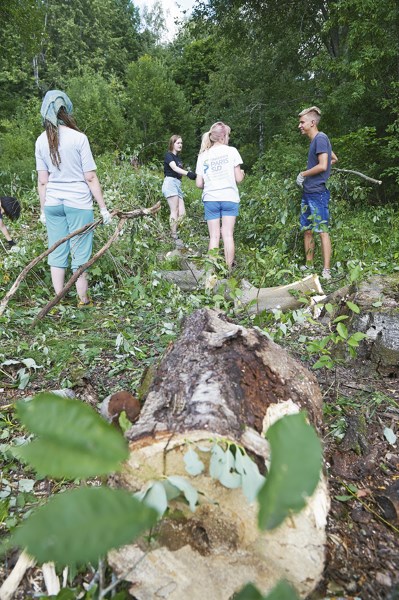 The guests live in two rooms of the manor house of Spasskoe-Kurkino Estate at the second-floor level, referring to this house as “the palace”. A larger ballroom was given to the girls who are more numerous than boys. The latter lodge in the private chambers of the prerevolutionary hosts, sleeping in couches and camping cots in Spartan conditions, with a duty scheme put up on the wall. The only luxury is free access to the Internet, the wires being diverted from a panel five-story house sitting 50 meters from the gentry nest. Communication with the outer world is necessary, as the volunteers admit, not for them (they would not mind full immersion in the rustic Russia), but for their loved ones.
The guests live in two rooms of the manor house of Spasskoe-Kurkino Estate at the second-floor level, referring to this house as “the palace”. A larger ballroom was given to the girls who are more numerous than boys. The latter lodge in the private chambers of the prerevolutionary hosts, sleeping in couches and camping cots in Spartan conditions, with a duty scheme put up on the wall. The only luxury is free access to the Internet, the wires being diverted from a panel five-story house sitting 50 meters from the gentry nest. Communication with the outer world is necessary, as the volunteers admit, not for them (they would not mind full immersion in the rustic Russia), but for their loved ones.Spaniard Lorena spoke about her daily talks and correspondence with her father, who was against her travel to Russia. Lorena has a funny way of showing her Dad’s surprise after he learned about her daughter’s itinerary. “To Russia alone? Have you gone mad?” she says in a roaring bass, rounding her eyes and jerking her lower lip. During the first three days of her stay in Russia Lorena sent him a couple dozens of photos over email, having made a photo comic story of her life in Kurkino. Seeing that his daughter is cheerful and surrounded with smiling folks, her father calmed down.
Living in the manor house meant a cocktail of three ages of Russian history for the guests. The estate’s architecture and narratives of local lore specialists introduces them to the 19th century. The 20th century is represented by paintings hung up on the walls at the time, when this manor house was a collective farm’s office. The paintings depict pioneers (Soviet scouts) competing at the stadium, jolly calf-woman caring for frolicking calves, etc. And the 21st century makes noises, laughs, sings, works and swears behind the window, as the manor house sits on one of the village’s most bustling streets.
The routine is not strict but compulsory. The breakfast is at 9 am, a planning brief – at 10:30, a workday begins at 11 am and ends (with a lunch break) at 17:30. Bedtime is 11 pm.
At work
The term “initiator” conjures up the image of a mason laying the first two bricks and then stepping aside, letting others finish the work. Entrepreneur Nikolai Saykin, the genuine initiator of this project, has never stepped aside, devoting all his spare time and spare money to the restoration of the abandoned Spasskoe-Kurkino estate, once a pearl of the Vologda country.
He can be found everywhere: on the ladder with a hammer in hand, at the city archives, in the reception room of the local governor, at the rostrum, on newspaper pages, in the shrubbery with a chainsaw in his hands. We found him near the pond covered with scum. “There is an entire chain of ponds here, installed by the Rezanovs, with mirror carps once splashing there,” he would tell us later. There is plain work for the foreign assistants, though it’s not that easy in the heat: piling the sawed wood – logs loaded on a wheel-barrow and twigs dragged by traction. Nikolai is the only person in the camp who does not speak English. He uses gestures for communication with his aids (he says, ‘drag this twig’ and leave the log) as well as widely known words “stop” and “OK”. The former he uses to warn them, when he is sawing a tree, and the latter he uses to lift his warning. There’s no misunderstanding.
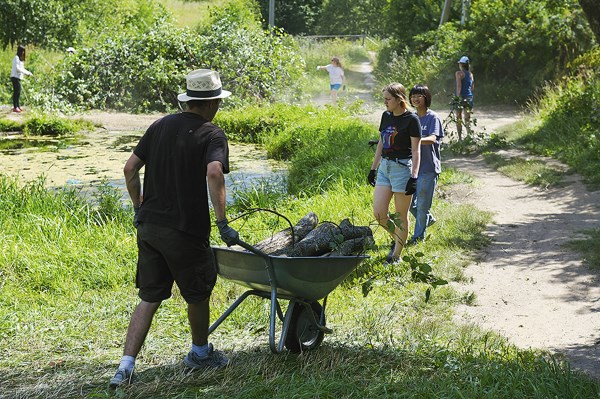
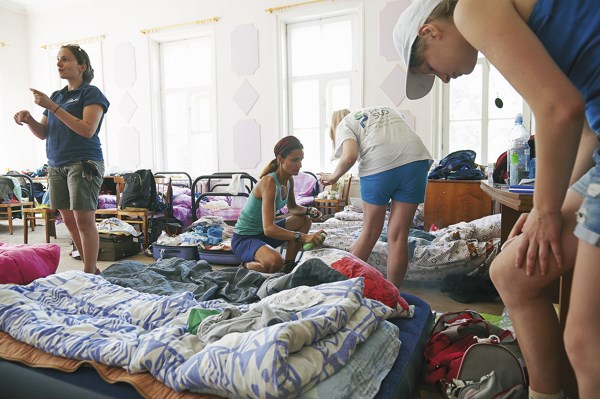
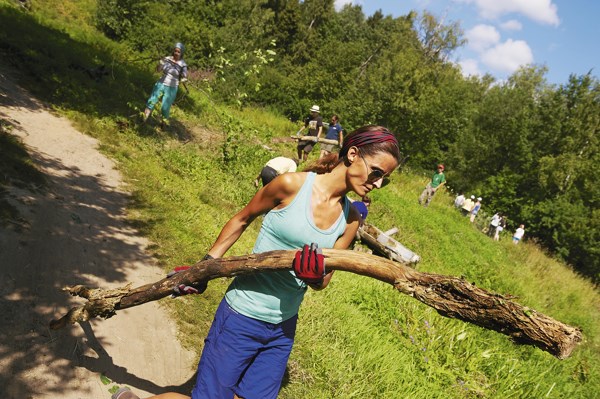
“Working with foreigners is a wonderful experience,” says Nikolai, as he fuels his chainsaw. “They are superb assistants, with girls not at all inferior to boys. I sometimes suggest that they should have some rest, saying we’ll finish the work with lads, but they take an offence saying ‘we are not worse’. A Finnish girl told me that in her country they have no such concept as ‘lady’s weakness’. There are only good workers and bad workers.”
Looking at the youths who hit the ground running after lunch, wearing sneakers on bare feet and do-rags, and do not make a single stop during three hours and a half, you realize that this is a real work camp, rather than a social-cultural center. The overseas team definitely earned their borsch and lodging. “The weather is excellent, I rest my body and mind here,” comments Lorena as she puts on her work gloves. “In my home Madrid the temperature is 40 degrees now and here it’s only 25 – no rain and no frost.”
“No, I am not tired, says Adele of France, dragging a huge birch twig. In a good company any work is a holiday. Her friends carry her on a wheel-barrow back to the pond, everyone laughing. “On the first day we dismantled a burnt-down outhouse, dragging burnt logs,” says the camp coordinator Ksenia. The boys and girls returned from their work black from head to feet, but they did not rush to shower cabins, but started marking each other with the charcoal.
The burnt outhouse had been reeling for several months in the wind and most villagers in Kurkino remember the ponds overgrown and littered since their early days. However, they are not quick to help Saykin and the volunteers. “I do not blame them as the summer is a hot season in the rural area – gardening, picking berries and mushrooms,” sighs the amateur restorer. “But… I don’t know… they could have lent a helping hand, perhaps, given that we do this for ourselves. Elderly folks are busy indeed but many young guys hang around idle. We repeatedly invited them: please come and help us. But to no avail, they do not care about this project and for some reason Finnish and French girls do. This is all wrong.”
Ksenia Shorokhova also admitted that there is some sort of soft pressure on the local population through this action. “We seem to tell the people of Kurkino: look what treasure you possess: the whole world admires it,” she noted. “Isn’t it a pity to leave this miracle in such a condition?”
Maybe this approach will work!
Author: Sergei Vinogradov




